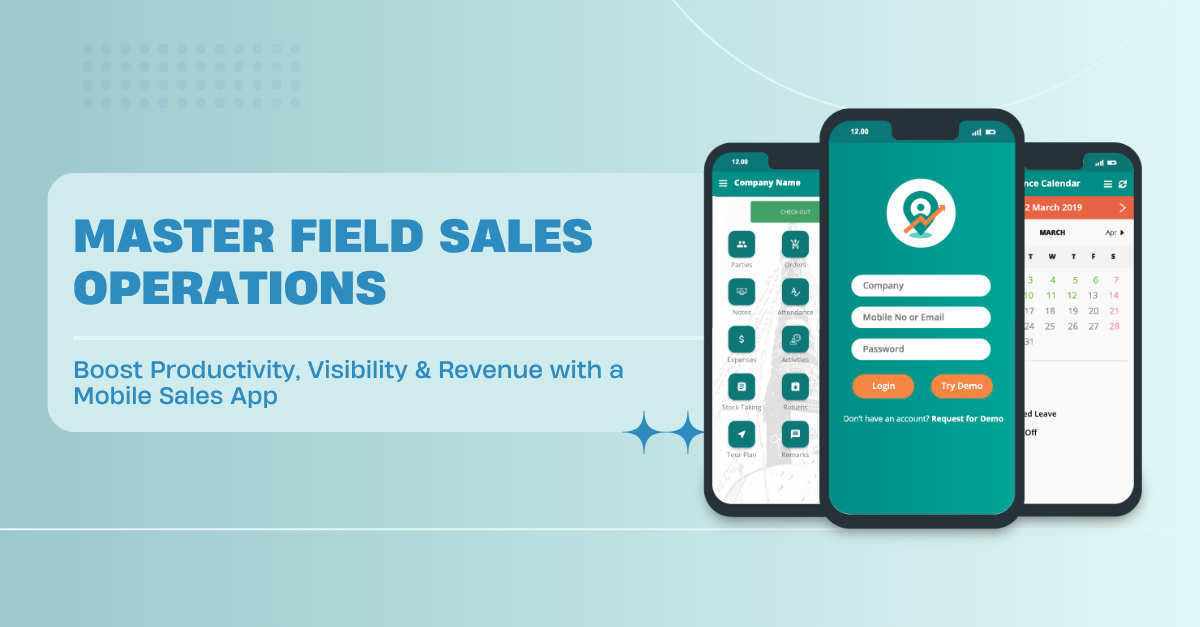Field Sales Management App: The Ultimate Guide to Smarter Sales Operations in 2025

A mobile sales management application is now crucial given the sharp changes in the field sales environment. Due to heightened client demands, tougher rivalry, and the requirement for immediate intelligence, overseeing a sales team working remotely presents greater challenges than before. This digital platform introduces transparency, streamlined operations, and responsibility into your off-site activities.
As companies prepare for 2025, incorporating more intelligent, evidence-based, and automated sales methods is absolutely necessary. Regardless of whether you represent an FMCG company, a distribution firm, or offer B2B services, implementing a strong sales management system has the potential to significantly improve your team's output and financial success.
What Is a Field Sales Management App?
A field sales management app is a mobile-first software that helps organizations manage, monitor, and optimize their field sales activities in real time. It acts as a bridge between your on-ground team and the office, ensuring that every sales rep’s activity from order collection to client visits is tracked and reported instantly.
In simple terms, it replaces traditional spreadsheets, manual reporting, and inconsistent communication with one unified digital platform.
Core functions include:
- Tracking sales representatives’ location and attendance
- Managing daily tasks, orders, and collections
- Monitoring sales performance and customer visits
- Providing analytics and insights for better decision-making
By using such an app, sales managers can plan, assign, and evaluate tasks efficiently while sales reps get tools to sell more effectively and save time.
Why Managing Field Sales Teams Is More Difficult Than Ever
Despite swift technological progress, numerous enterprises still encounter considerable difficulties overseeing their on-site sales forces. These issues not only impede workflow but may also negatively impact earnings, client contentment, and staff output. Below are the most frequently seen barriers:
1. Lack of Real-Time Visibility
Lacking a unified platform, supervisors frequently have trouble tracking sales personnel locations throughout the day or confirming if scheduled appointments are being fulfilled. This absence of openness complicates optimizing routes, allocating work effectively, or stepping in when issues emerge.
2. Inefficient Order Tracking
Collecting orders manually and relying on paper systems can lead to slowed fulfillment, lost orders, and inaccuracies. This hampers the speed of order processing, impacts how stock is tracked, and might ultimately displease patrons expecting prompt and correct service.
3. Poor Communication
Field personnel and support personnel frequently encounter communication breakdowns stemming from irregular updates or slow information sharing. Such discrepancies can result in overlooked next steps, obscured objectives, and general inefficiency in resource allocation, ultimately affecting sales outcomes.
4. Data Inaccuracy
Depending on spreadsheets or manual reports frequently results in inconsistent or shaky data. Lacking precise insights, managers are unable to spot patterns, anticipate needs, or form well-grounded strategic choices.
5. Performance Tracking Difficulties
Assessing team output without automated tools turns into mere speculation. Leaders find it difficult to gauge key metrics like appointment fulfillment, success ratios, and regional effectiveness, which complicates recognizing top contributors or assisting struggling salespersons.
Top Benefits of Using a Field Sales Management App
Implementing a dedicated app for managing your field team can completely transform how your business operates.
Here’s how:
a. Enhanced Productivity and Accountability
Sales reps can plan their day, access client data, and record activities digitally. Managers can monitor progress, identify gaps, and take corrective actions in real time.
b. Real-Time GPS Tracking
Live location tracking ensures transparency and helps verify field visits. It also assists in optimizing routes to save time and fuel costs.
c. Efficient Order & Payment Management
From order taking to collection tracking, every transaction is recorded instantly improving accuracy and speeding up billing cycles.
d. Data-Driven Decision Making
The app gathers valuable analytics on sales trends, customer behavior, and team performance, empowering managers to make informed decisions.
e. Streamlined Communication
Built-in chat and notifications ensure seamless collaboration between field teams and office staff.
f. Reduced Administrative Burden
Automation reduces paperwork, manual entry, and repetitive follow-ups, allowing sales teams to focus on selling, not reporting.
In essence, adopting a field sales management app leads to better visibility, reduced costs, and stronger customer relationships.
Must-Have Features in a Field Sales Management App for 2025
Not all sales management apps are created equal. In 2025, businesses should look beyond basic tracking and focus on features that promote scalability, intelligence, and integration.
Here’s what to look for:
- Smart GPS Tracking & Attendance - Real-time visibility into rep locations and visit logs.
- Order & Collection Management - Quick order entry, status tracking, and payment updates.
- Retail Execution & Merchandising Tools - Capture photos, ensure planogram compliance, and monitor retail visibility.
- Expense & Route Optimization - Simplify route planning and reduce unnecessary costs.
- Performance Analytics Dashboard - Real-time reports on KPIs, targets, and sales trends.
- Offline Functionality - Ensure uninterrupted data entry even without internet access.
- Integration Capabilities - Connect with CRM, ERP, and accounting tools for unified operations.
- User-Friendly Interface - A clean, intuitive design that minimizes training time and boosts adoption.
How to Choose the Right App for Your Business
Selecting the right field sales management app is more than just comparing features. It’s about aligning the tool with your team’s workflow, business size, and growth goals.
Here’s a step-by-step approach:
- Identify Your Core Needs: Do you need order tracking, retail execution, GPS tracking, or all-in-one automation?
- Evaluate Scalability: Choose a solution that grows with your expanding team and market presence.
- Check Ease of Use: A complex app will discourage reps from using it consistently.
- Request a Demo or Trial: See how the app performs in real-world conditions.
- Assess Support & Training: Opt for providers that offer onboarding assistance and continuous technical support.
- Compare Cost vs. ROI: Focus on long-term value rather than just the price tag.
How Companies Are Growing with Sales Automation
Organizations that have embraced a Field Sales App are experiencing significant improvements in output, team synergy, and client happiness. The effect of digitalization extends well beyond basic monitoring; it fosters effectiveness, responsibility, and quantifiable expansion.
Here’s what this looks like in practice:
1. Faster Order Fulfillment
Through immediate order handling, businesses can substantially cut down on delivery timelines and remove holdups resulting from manual data input. Representatives can enter requests directly while on-site, guaranteeing that stock levels refresh immediately and orders arrive at the storage facility or fulfillment hub without hold-up. This swiftness not only boosts operational effectiveness but also elevates client contentment by shortening the time spent waiting.
2. Improved Team Visibility
Leaders achieve full view of their on-site personnel, encompassing real-time positioning, job progress updates, and visit summaries. This clarity supports superior scheduling, route refinement, and asset deployment. Furthermore, it assists in pinpointing top-performing agents and segments requiring further assistance or coaching, fostering a more responsible and driven group.
3. Enhanced Sales Performance
By utilizing information-based intelligence, companies can identify leading areas, merchandise, and approaches. This facilitates more precise marketing efforts, better geographical organization, and concentrated chances for upselling or complementary sales. As routine functions are automated, sales personnel gain more capacity for cultivating connections and finalizing transactions, resulting in a direct uplift in earnings.
4. Enhanced Customer Relationships
Regular check-ins, prompt site visits, and correct order processing cultivate confidence and dedication with patrons. A mobile sales application guarantees each touchpoint is recorded and detailed, enabling swift attention to client requirements. Over the duration, this fosters more robust collaborations, recurring engagements, and a favorable image for the company.
5. Optimized Decision-Making
Beyond merely streamlining operations, automation furnishes insights and visualizations that reveal patterns, areas needing improvement, and avenues for expansion. Leaders can swiftly arrive at tactical choices, supported by trustworthy metrics, and modify approaches almost instantly to react to shifting market conditions.
Businesses using Delta Sales App have witnessed up to 30 - 40% improvement in productivity and significant reduction in administrative tasks, empowering managers to focus on strategy rather than manual oversight.
Final Thoughts: The Future of Smarter Field Sales Operations
As 2025 progresses, technology will keep reshaping the way sales teams in the field function. The path forward involves automation, data analysis, and AI-aided choices, where mobile applications go beyond simple tracking to forecast and enhance performance.
For any enterprise dependent on outside sales staff, implementing a field sales management application is more than a technological improvement; it's a calculated step towards greater productivity, responsibility, and expansion.
With solutions like Delta Sales App, companies can seamlessly manage their teams, track every sales activity, and ensure their on-ground operations are as smart and agile as the market demands.









